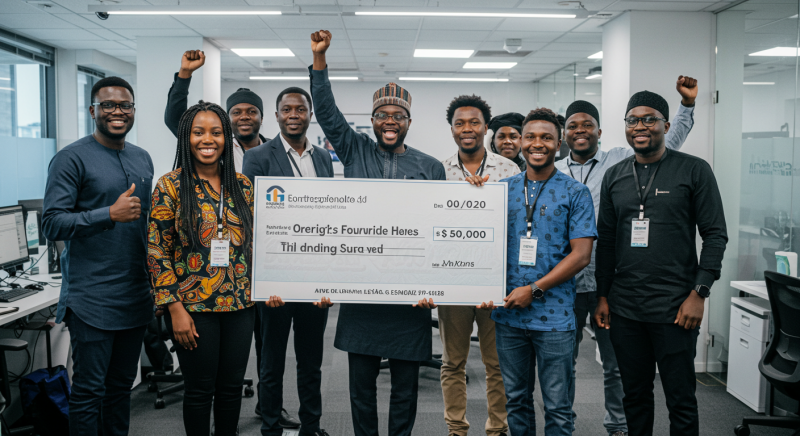As a young Nigerian entrepreneur, you’ve probably watched in admiration as success stories like Paystack, Flutterwave, and Andela dominated headlines while wondering how they secured their initial funding. The truth is, behind every thriving tech startup lies strategic funding decisions, and in 2025, tech startup grants for Nigeria have become more accessible than ever before. Whether you’re coding the next fintech revolution from your Lagos apartment or developing agritech solutions in Abuja, understanding the landscape of available grants can transform your entrepreneurial journey from mere ambition to tangible success.
Key Takeaways
Understanding the current ecosystem of tech startup grants for Nigeria requires recognizing three fundamental pillars that support early-stage companies. First, government initiatives through programs like the Nigeria Youth Investment Fund provide substantial financial backing with less stringent repayment terms compared to traditional loans. Second, international tech giants like Google offer specialized programs targeting African innovators, creating pathways for global market entry. Third, local incubators such as CC Hub combine funding with mentorship, providing comprehensive support systems that address both financial and operational challenges facing Nigerian startups.
The significance of these funding opportunities extends beyond immediate capital injection. They represent validation of your business model, provide access to networks of successful entrepreneurs, and often include technical support that can accelerate product development timelines. Most importantly, securing grants for Nigeria tech startup positions your company for subsequent funding rounds, as grant recipients often demonstrate higher success rates in attracting venture capital investments.

Understanding Nigeria’s Tech Startup Grant Landscape in 2025
The Nigerian startup ecosystem has experienced remarkable transformation, with funding reaching unprecedented levels as both local and international investors recognize the country’s potential. The Nigeria Youth Investment Fund (NYIF) represents a N110 billion government initiative specifically designed to support Nigerian youth in creating jobs and starting businesses, marking the largest government commitment to startup funding in the country’s history.
This growth reflects broader recognition of technology’s role in economic diversification. The Nigerian government, through various agencies, has prioritized startup support as part of national development strategies. Understanding this context helps entrepreneurs appreciate why tech startup grants for Nigeria have become increasingly competitive and why preparation remains crucial for successful applications.
The ecosystem operates through interconnected networks of government agencies, private incubators, international development organizations, and corporate innovation programs. Each funding source comes with specific requirements, timelines, and expectations, making strategic planning essential for entrepreneurs seeking to maximize their funding potential.
Federal Government Grants: Your Gateway to Official Support
Nigeria’s federal government has revolutionized startup support through comprehensive grant programs designed to stimulate economic growth and job creation. The Presidential Conditional Grant Scheme (PCGS) provides ₦50,000 grants to eligible small businesses, representing the government’s commitment to supporting one million entrepreneurs, though this program serves as an entry point rather than primary funding for tech startups.
More substantial opportunities exist through specialized technology-focused initiatives. The Nigeria Startup Act 2022 created frameworks specifically designed to support tech entrepreneurs, establishing legal protections and incentive structures that make tech startup grants for Nigeria more accessible and predictable. This legislation represents a fundamental shift in government approach, moving from general business support to targeted tech sector development.
Federal government grants typically require detailed business plans, proof of concept demonstrations, and clear job creation projections. The application process involves multiple stages, including preliminary screening, detailed proposal submission, and final presentation phases. Success rates improve dramatically when entrepreneurs align their proposals with national development priorities such as financial inclusion, agricultural innovation, or digital infrastructure development.
The advantages of federal grants extend beyond immediate funding. Recipients gain access to government networks, potential contract opportunities, and credibility that facilitates future fundraising efforts. However, these grants often come with reporting requirements and performance metrics that entrepreneurs must carefully consider before applying.
Google for Startups: International Opportunities for Nigerian Entrepreneurs
Google’s commitment to African tech development has created substantial opportunities for Nigerian entrepreneurs seeking tech startup grants through international channels. Google for Startups Accelerator Africa provides selected companies with up to $100,000 in non-dilutive funding, along with three months of intensive mentorship and access to Google’s global network of technical experts.
The program focuses on startups addressing local challenges through technology, particularly in sectors like fintech, healthtech, edtech, and agritech. Nigerian companies have consistently performed well in Google’s selection processes, with successful alumni including companies that have gone on to raise significant venture capital funding.
Google’s approach combines financial support with technical resources, including cloud computing credits, product development guidance, and market expansion strategies. For Nigerian startups targeting continental or global markets, Google’s programs provide invaluable experience in scaling beyond local boundaries.
Application requirements emphasize product-market fit, scalability potential, and social impact. Google particularly values startups that demonstrate clear paths to profitability while addressing significant social challenges. The selection process involves multiple rounds of evaluation, including technical assessments, business model reviews, and founder interviews.
Beyond direct funding, Google provides ongoing support through alumni networks, follow-on investment opportunities, and partnership possibilities with Google’s various product divisions. This comprehensive approach makes Google programs particularly attractive for tech startup grants for Nigeria seekers who prioritize long-term growth over immediate capital needs.
CC Hub and Major Incubators: Comprehensive Development Support
Co-Creation Hub (CC Hub) stands as Africa’s largest technology incubator, offering some of the most comprehensive tech startup grants available through structured programs designed for different startup stages. CC Hub’s incubation program provides startups with up to $25,000 in funding along with free office space during their 12-month development period, creating an environment where entrepreneurs can focus entirely on product development and market validation.
The incubator’s approach combines financial support with practical resources including legal services, accounting support, technical mentorship, and market access facilitation. CC Hub’s network includes successful entrepreneurs, corporate partners, and investor connections that provide startups with pathways to subsequent funding rounds.
CC Hub’s Edtech Fellowship Program represents a $15 million commitment to supporting 72 startups across Nigeria and Kenya over three years, demonstrating the organization’s capacity for large-scale startup development. This program specifically targets educational technology solutions, reflecting growing recognition of education sector opportunities.
Other major incubators contributing to tech startup grants for Nigeria include Orange Corners Nigeria, which offers up to €40,000 in funding, and various sector-specific incubators focusing on fintech, agritech, and healthtech solutions. Each incubator brings unique advantages, from specific industry expertise to particular investor networks.
The incubator selection process typically involves multiple application rounds, including written applications, pitch presentations, and due diligence phases. Success requires demonstrating clear market opportunity, viable business models, and strong execution capabilities. Incubators particularly value teams with complementary skills and previous startup experience.
Strategic Application Approaches for Maximum Success
Successfully securing tech startup grants for Nigeria requires understanding that each funding source evaluates applications differently, making targeted preparation essential for maximizing approval chances. Government grants prioritize job creation and economic impact, while private incubators focus on scalability and market potential, and international programs emphasize innovation and social impact.
Developing compelling applications starts with thorough market research demonstrating clear understanding of customer needs, competitive landscapes, and revenue opportunities. Successful applicants typically provide detailed financial projections, customer acquisition strategies, and risk mitigation plans that address potential challenges proactively.
Documentation requirements vary significantly across funding sources, but common elements include executive summaries, detailed business plans, financial models, market analysis, and team biographies. Quality matters more than quantity, with reviewers appreciating concise, well-structured proposals that clearly articulate value propositions and growth strategies.
Timing considerations play crucial roles in application success. Many tech startup grants operate on annual cycles with specific application windows, making advance planning essential. Early-stage startups benefit from applying to multiple programs simultaneously, while later-stage companies might focus on larger, more competitive opportunities.
Building relationships within the startup ecosystem significantly improves application success rates. Attending industry events, participating in accelerator programs, and connecting with successful entrepreneurs creates networks that provide valuable guidance, introductions, and endorsements during application processes.

Essential Documentation and Requirements
Preparing comprehensive documentation packages remains fundamental to securing tech startup grants for Nigeria, with successful applicants demonstrating attention to detail and professional presentation standards. Executive summaries serve as first impressions, requiring clear articulation of business concepts, market opportunities, and funding requirements within concise formats that capture reviewer attention immediately.
Business plans must balance comprehensive information with readability, covering market analysis, competitive positioning, revenue models, marketing strategies, operational plans, and growth projections. Financial models should include detailed assumptions, sensitivity analyses, and scenario planning that demonstrate thorough understanding of business economics.
Team presentations require highlighting relevant experience, complementary skills, and commitment levels that convince reviewers of execution capabilities. Many funding sources specifically evaluate founder-market fit, seeking evidence that entrepreneurs possess deep understanding of customer needs and industry dynamics.
Legal documentation varies by funding source but commonly includes incorporation certificates, tax compliance records, intellectual property registrations, and partnership agreements. International programs may require additional documentation regarding foreign investment permissions and regulatory compliance.
Technical documentation becomes particularly important for tech startup grants for Nigeria in sectors like fintech or healthtech, where regulatory considerations affect operational feasibility. Product demonstrations, architecture diagrams, and security assessments help reviewers understand technical capabilities and scalability potential.
Timeline and Application Process Management
Managing application timelines effectively requires understanding that securing tech startup grants for Nigeria involves extended processes with multiple decision points and varying response times. Government grants typically require 3-6 months from application submission to final approval, while private incubators may complete evaluations within 6-8 weeks.
Creating comprehensive application calendars helps entrepreneurs track multiple opportunities simultaneously while ensuring adequate preparation time for each submission. Successful applicants often begin preparation 2-3 months before application deadlines, allowing time for document refinement, team coordination, and stakeholder feedback incorporation.
Application processes generally follow similar structures beginning with preliminary screening based on basic eligibility criteria, followed by detailed proposal reviews, and concluding with final presentations or interviews. Understanding each phase helps entrepreneurs prepare appropriately and avoid common mistakes that eliminate applications prematurely.
Communication strategies during application processes balance proactive engagement with respect for reviewer timelines. Following up appropriately demonstrates professionalism while excessive contact may create negative impressions. Successful applicants maintain regular communication with program coordinators while respecting established communication protocols.
Contingency planning becomes essential given competitive nature of tech startup grants for Nigeria, with successful entrepreneurs typically applying to multiple programs simultaneously. Diversification strategies reduce risk while increasing overall funding probability, though entrepreneurs must carefully manage time and resource allocation across multiple applications.
Common Mistakes and How to Avoid Them
Application failures for tech startup grants for Nigeria often stem from preventable mistakes that experienced entrepreneurs learn to avoid through careful preparation and attention to program requirements. Inadequate market research represents the most common weakness, with applicants failing to demonstrate deep understanding of customer needs, market size, and competitive dynamics.
Financial projections frequently contain unrealistic assumptions that undermine credibility with experienced reviewers. Successful applicants provide conservative estimates supported by detailed market research and comparable company analysis, avoiding overly optimistic growth projections that suggest poor business judgment.
Team composition issues arise when entrepreneurs fail to demonstrate complementary skills or adequate commitment levels. Funding sources prefer teams with diverse expertise covering technical development, business operations, and market development, rather than groups with overlapping capabilities or part-time involvement.
Documentation quality problems include poor presentation, incomplete information, or failure to follow specified formats. Professional presentation standards matter significantly, with well-organized, clearly written applications receiving more favorable consideration regardless of underlying business quality.
Strategic alignment failures occur when entrepreneurs apply to inappropriate funding sources without understanding program objectives or selection criteria. Researching program history, successful recipient profiles, and stated investment priorities helps avoid misaligned applications that waste time and resources.
Success Stories and Case Studies
Nigerian startup success stories provide valuable insights into effective strategies for securing tech startup grants for Nigeria while demonstrating the transformative impact of proper funding on business development. Paystack’s early development benefited from strategic grant funding that enabled founder focus on product development rather than immediate revenue generation, ultimately facilitating the company’s eventual $200 million acquisition by Stripe.
Flutterwave’s growth trajectory illustrates how combining multiple funding sources creates sustainable development paths. The company leveraged early-stage grants to validate market opportunity before attracting venture capital investments that enabled continental expansion and eventual $3 billion valuation.
Andela’s development model demonstrates how international tech startup grants for Nigeria can create globally competitive companies addressing local talent development needs. The company’s early Google and other international grant support enabled establishment of training programs that produced thousands of skilled developers while building sustainable business models.
More recent success stories include companies like Korapay, which utilized CC Hub incubation support to develop payment infrastructure solutions now serving millions of users across Africa. Their experience demonstrates how comprehensive incubator programs combine funding with technical support and market access facilitation.
These success stories share common elements including strategic timing of funding applications, alignment between business models and funder objectives, and effective utilization of non-financial support including mentorship, network access, and technical resources. Learning from these examples helps current entrepreneurs develop more effective funding strategies.
Future Outlook and Emerging Opportunities
The landscape for tech startup grants for Nigeria continues evolving as government policies, international development priorities, and private sector initiatives adapt to changing market conditions and technological opportunities. The Nigeria Startup Act 2022’s implementation promises expanded government support through tax incentives, regulatory streamlining, and increased funding allocations.
International focus on African technology development suggests continued growth in funding opportunities from organizations like Google, Microsoft, Facebook, and various development finance institutions. Climate change initiatives particularly create new funding categories for startups addressing environmental challenges through technology solutions.
Sector-specific opportunities continue expanding, with fintech, healthtech, edtech, and agritech receiving particular attention from both government and private funders. The COVID-19 pandemic’s impact has accelerated digital adoption, creating sustainable market opportunities that support long-term business viability.
Corporate venture capital growth in Nigeria indicates increased private sector investment in startup development, complementing traditional grant funding with more substantial growth capital. This trend suggests improved pathways from early-stage grants to significant expansion funding.
Regional integration initiatives create opportunities for Nigerian startups to access continental markets more easily, making tech startup grants more attractive to international funders interested in African market development. Understanding these trends helps entrepreneurs position their businesses for long-term success.

Conclusion
Securing tech startup grants for Nigeria requires strategic approach combining thorough preparation, appropriate program selection, and professional execution throughout application processes. The current funding landscape offers unprecedented opportunities for Nigerian entrepreneurs willing to invest time and effort in understanding funder requirements and developing compelling proposals.
Success depends on recognizing that grants represent more than immediate funding sources. They provide validation, network access, mentorship opportunities, and credibility that facilitate subsequent fundraising efforts. Entrepreneurs who approach grant applications strategically position themselves for long-term business success beyond initial capital requirements.
The key to success lies in matching business objectives with appropriate funding sources while maintaining high standards for application quality and professional presentation. Nigerian entrepreneurs who master these skills find themselves well-positioned to compete globally while contributing to local economic development.
As Nigeria’s startup ecosystem continues maturing, tech startup grants for Nigeria will remain essential components of entrepreneurial success strategies. Entrepreneurs who begin preparation early, maintain persistence through competitive processes, and learn from both successes and failures ultimately achieve their funding objectives while building sustainable businesses.
The future holds tremendous promise for Nigerian tech entrepreneurs willing to navigate the grant application landscape strategically. With proper preparation, appropriate program selection, and professional execution, securing funding becomes achievable step toward building transformative technology businesses.
Frequently Asked Questions
Q: What is the minimum amount typically available through tech startup grants for Nigeria? A: Grant amounts vary significantly, ranging from ₦50,000 through government programs like PCGS to $100,000+ through international programs like Google for Startups. Most incubators offer $10,000-$25,000 ranges.
Q: How long does the typical application process take for tech startup grants for Nigeria? A: Application timelines vary by program, with government grants requiring 3-6 months, private incubators taking 6-8 weeks, and international programs typically completing evaluations within 2-4 months.
Q: Do I need to have a registered company to apply for tech startup grants for Nigeria? A: Most programs require formal business registration, though some early-stage programs accept applications from teams in formation. Government grants particularly emphasize proper legal registration and tax compliance.
Q: Can I apply to multiple grant programs simultaneously? A: Yes, applying to multiple programs simultaneously is encouraged and increases funding probability. However, ensure you can manage multiple application processes and meet all program requirements effectively.
Q: What are the most common reasons applications for tech startup grants for Nigeria get rejected? A: Common rejection reasons include inadequate market research, unrealistic financial projections, incomplete documentation, poor team composition, and misalignment between business models and funder objectives.
Q: Do tech startup grants for Nigeria require equity dilution? A: Most grants are non-dilutive, meaning they don’t require equity exchange. However, some programs include investment components or conversion options that may affect ownership structures.
Q: What sectors are most successful in securing tech startup grants for Nigeria? A: Fintech, healthtech, edtech, and agritech consistently receive strong funding support due to their alignment with development priorities and market opportunities.
Q: How important is having a prototype when applying for tech startup grants for Nigeria? A: While not always required, having functional prototypes significantly strengthens applications by demonstrating execution capability and market validation. Many successful applicants present working products or detailed mockups.
External Source Links
- Silicon Africa – Tech Grants in Nigeria 2025
- MOC Accountants – Government Support Programs for Nigerian Startups
- Nigeria Startup Portal – Official Government Platform
- CC Hub Africa – Official Website
- Business Day NG – Funding Options for Nigerian Startups
READ MORE
10 Most Profitable Online Businesses in Australia 2025
